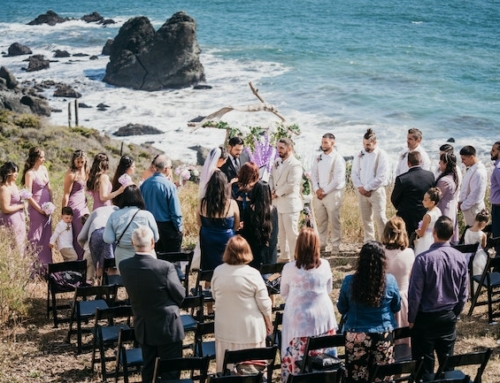Destination weddings have become increasingly popular over the years as more and more couples are looking for unique and memorable ways to celebrate their special day. A destination wedding is a wedding that takes place away from the couple’s hometown and involves traveling to a different location. The concept of destination weddings has been around for a long time, but it was not until recently that they became more popular among couples.
A survey by WeddingWire found that 40% of couples were considering a destination wedding in 2021 due to COVID-19 travel restrictions. Destination weddings offer many benefits, such as providing a unique and memorable experience for both the couple and their guests. They also allow for more intimate celebrations and simplified planning processes. In this article, we will explore tips for planning a successful destination wedding and the benefits of having one.

Choosing a Destination
Choosing the right destination for your wedding is one of the most important decisions you will make during the planning process. Here are some tips to help you choose the perfect location for your destination wedding:
Research potential destinations
Start by researching potential destinations that you and your partner would love to visit. Consider the weather, local attractions, and activities that you and your guests can enjoy.
Evaluate your budget and guest list
Consider your budget and the number of guests you plan to invite when selecting a destination. Some locations may be more expensive than others, and you want to make sure you can accommodate all of your guests comfortably.
Understand local marriage requirements and laws
Every country has its own marriage requirements and laws, so make sure you understand them before choosing a destination. Research the legal requirements for getting married in the country you are considering and make sure you have enough time to obtain the necessary documents.

Consider the time of year
The time of year can greatly impact your destination wedding experience. Some destinations may have better weather or lower travel costs during certain seasons, so consider the time of year when choosing a location.
Think about accessibility
Consider how easy it is for you and your guests to get to the destination. Is it easily accessible by plane or will additional transportation be necessary?
By carefully evaluating each of these factors, you can select a destination that is perfect for you and your guests, making your destination wedding an unforgettable experience.
Planning the Event

Planning a destination wedding can be a bit more complex than planning a traditional wedding due to the logistical challenges of coordinating a celebration in an unfamiliar location. Here are some tips to help you plan your destination wedding:
- Work with a destination wedding planner: A wedding planner who specializes in destination weddings can be a great resource. They can help you navigate the challenges of planning a wedding in a foreign country, as well as connect you with reputable local vendors.
- Select vendors and suppliers in the destination: Try to hire local vendors and suppliers whenever possible. This not only supports the local economy but also ensures that you are working with professionals who know the area well.
- Coordinate travel and accommodations for guests: Help your guests plan their travel by providing them with detailed information about transportation options, accommodations, and local attractions. Consider negotiating group rates with hotels or rental properties to make the process easier for your guests.
- Plan activities and events for guests: Destination weddings offer a unique opportunity to spend quality time with your guests, so plan some group activities and events to make the most of your time together. Consider organising a welcome dinner or a group excursion to a local attraction.
Legal Considerations

Getting legally married in a foreign country can be complicated, so it’s essential to do your research and understand the legal requirements before planning your destination wedding. Here are some important legal considerations to keep in mind:
- Obtain necessary documentation: Make sure to obtain all the necessary documentation required to get married in the country you have chosen. This might include your passport, birth certificate, divorce decree, and/or death certificate of a former spouse.
- Understand legal requirements for marriages in foreign countries: The legal requirements for getting married in foreign countries vary widely, so it’s essential to understand them before planning your wedding. This might include residency requirements, blood tests, and other legal documentation.
- Ensure legal recognition of the marriage in your home country: Before planning your wedding, make sure to understand the process for ensuring that your marriage will be legally recognized in your home country. This may involve getting your marriage certificate translated, notarized, and/or apostilled.
- Consider having a legal ceremony at home: If the legal requirements for getting married in a foreign country are too complicated, consider having a small legal ceremony at home before or after your destination wedding.
Financial Considerations

Destination weddings can be more expensive than traditional weddings due to the additional costs associated with travel, accommodations, and other logistical expenses. Here are some financial considerations to keep in mind when planning your destination wedding:
Establish a realistic budget
Set a realistic budget for your destination wedding and stick to it. Consider all the additional costs associated with a destination wedding, including travel, accommodations, and vendor expenses.
Negotiate group rates with vendors and suppliers
Consider negotiating group rates with vendors and suppliers, such as photographers, caterers, and musicians, to save money.

Plan in advance
Plan your destination wedding well in advance to take advantage of early bird discounts and other cost-saving opportunities. This also gives you and your guests time to save money and plan accordingly.
Consider a smaller guest list
A smaller guest list can help reduce the costs associated with a destination wedding, so consider inviting only close family and friends.
Use credit card rewards and other travel perks
If you have a travel rewards credit card or other travel perks, consider using them to save money on flights, accommodations, and other expenses associated with your destination wedding.
By establishing a realistic budget, negotiating with vendors, planning in advance, and taking advantage of travel perks, you can enjoy a beautiful and memorable destination wedding without breaking the bank.










